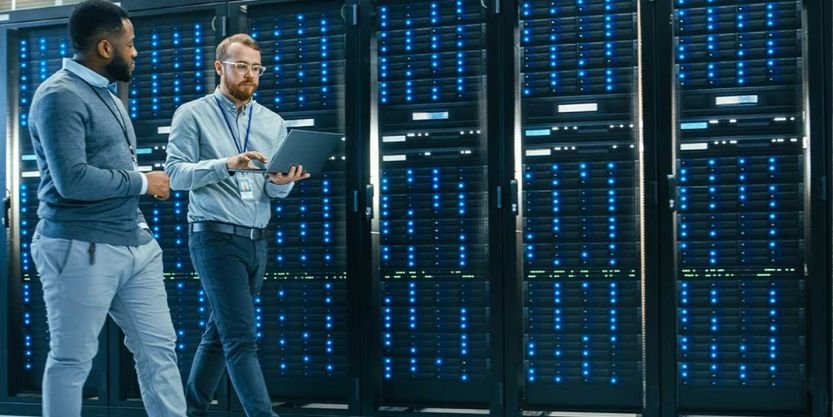The Data Center Market in Germany is experiencing a notable evolution, propelled by the demand for artificial intelligence, initiatives focused on renewable energy, and swift digital transformation.
Forecasts indicate an increase from $7.71 billion in 2024 to $12.84 billion by 2030, reflecting a compound annual growth rate (CAGR) of 8.87%. This growth is drawing considerable investments from both established firms and emerging players.
This article explores the primary trends, investment prospects, and elements influencing the future landscape of data centers in Germany.
Market Expansion and Investment Dynamics
Germany’s strong economy and consistent regulatory framework render it a prime location for data center investments.
The government’s backing of the technology sector has further bolstered the Data Center Market, ensuring adherence to sustainability objectives and industry standards.
Frankfurt continues to be the premier hub, with significant investors such as Equinix, Digital Realty, and NTT DATA enhancing their operations in the region.
Emergence of New Competitors
The arrival of new entities like Bluestar Data Center, STACK Infrastructure, and VIRTUS Data Centers has heightened competition within the market.
These organizations introduce innovative methodologies in data storage, cloud computing, and AI-driven solutions, addressing the rising demand for secure and efficient data center services.
Impact of AI Demand and Digital Transformation
The surge in artificial intelligence applications has profoundly influenced the Data Center Market in Germany.
As highlighted in NetApp’s 2024 Cloud Complexity Report, 74% of global organizations consider data to be the most vital element for achieving success in AI.
As a result, the implementation of intelligent data strategies is essential for delivering secure, scalable, and cost-effective solutions.

Additionally, the ongoing digital transformation across various sectors has increased the necessity for sophisticated data storage and processing capabilities.
As companies incorporate AI into their workflows, data centers must adapt to meet the escalating computational requirements.
Energy Efficiency and Sustainability Initiatives
Germany has traditionally depended on fossil fuels for its energy needs. However, in pursuit of achieving net-zero carbon emissions by 2060, the nation has significantly increased its renewable energy output.
The implementation of sustainable data center solutions, including energy-efficient cooling systems and AI-enhanced power management, is becoming essential for the growth of the industry.
Adoption of Liquid Cooling Solutions
The rise of AI-capable data centers is leading to a heightened demand for liquid cooling technologies. For example, Global Switch has introduced a chilled water-cooling system at its Frankfurt North data center.
These innovations contribute to optimizing energy usage while ensuring operational effectiveness.
Colocation and Hyperscale Investments
Colocation services are a key factor driving data center investments in Germany. Companies like AtlasEdge, CloudHQ, and CyrusOne are expanding their colocation facilities to meet the increasing demands of enterprises.
Furthermore, hyperscale data centers are emerging to address the needs for extensive data storage and cloud computing.
Regional Expansion and Future Developments
Germany’s data market is experiencing rapid growth across multiple cities, with over 37 new facilities planned. These data centers are to meet a variety of business requirements, providing both retail and wholesale colocation services.
Collaborations between the government and data center operators are focused on enhancing infrastructure resilience, reducing cyber threats, and ensuring adherence to strict security regulations.
These initiatives are anticipated to further enhance investor confidence and accelerate market expansion.
Key Takeaways and Future Outlook
The data center market in Germany is set for significant growth, driven by advancements in AI, digitalization, and sustainability initiatives.
The presence of prominent global companies, along with new entrants, is promoting innovation and fostering competition.
Energy-efficient strategies, such as liquid cooling and the incorporation of renewable energy, are increasingly becoming popular.
Colocation and hyperscale data centers are set to play a pivotal role in the market, providing scalable options for enterprises.
Government initiatives and sustainability pledges will bolster industry growth, promoting long-term development.
Expert Editorial Comment
The data center sector in Germany is set for substantial expansion, fueled by advancements in artificial intelligence, ongoing digital transformation, and sustainability efforts.
Both international and domestic investments are contributing to a notable increase in the demand for energy-efficient and AI-compatible infrastructure.
Additionally, government backing and initiatives focused on renewable energy enhance the market’s prospects, promoting long-term stability and innovation.
As businesses increasingly emphasize data security, scalability, and performance, Germany continues to be a pivotal location for data center growth.
In summary, the outlook for the data center market in Germany is optimistic, with swift developments poised to influence the industry for the foreseeable future.

